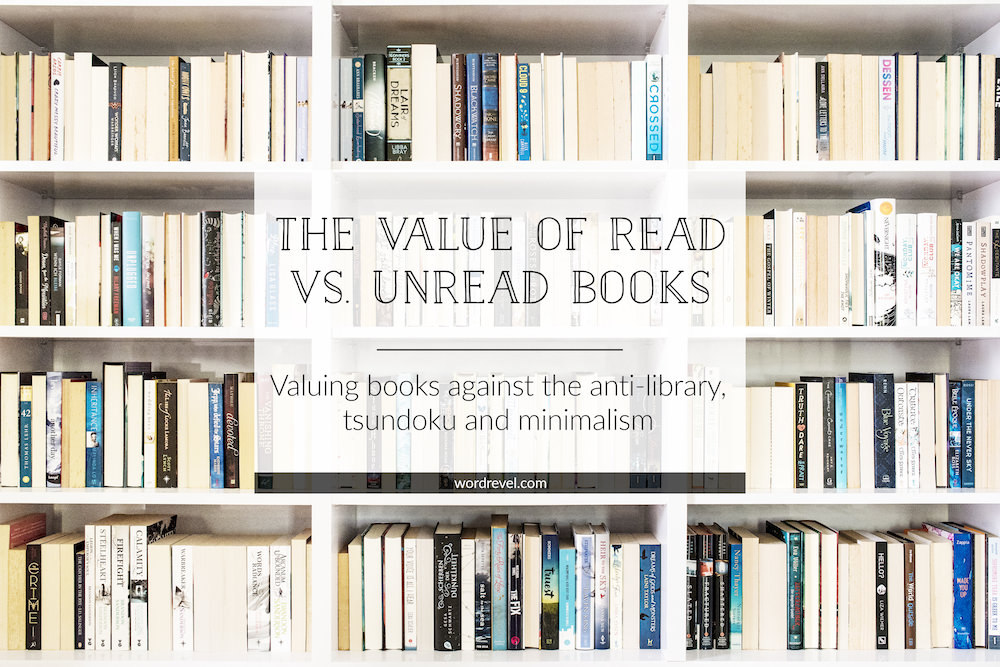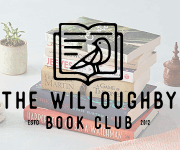
A few years ago, I came across one of Sana’s Goodreads shelves that she had named anti-library. While the term still unsettles me as much today as it did back then, the idea behind it is a poignant one. You see, the anti-library contains books the owner hasn’t read, a point of greater importance to Umberto Eco. For many a reader, this is also known as the TBR (to be read) pile. Interestingly, several bloggers find that the TBR pile has become a source of stress, and some feel liberated without one.
These differing attitudes beg the question — what’s the value of read vs. unread books? Which ones should we have more of in our personal libraries, if any at all? The answer depends on various factors, some of which I set out to explore as I reflect on my thoughts and attitudes towards books.
Prizing the Anti-library
An anti-library is one that opens up possibilities. It reminds us that there’s so much more we can yet know and experience. Unread books offer materials for research that expand out knowledge and inspire new ideas. They hold stories that can transport us to new worlds. The bigger an anti-library, the more books we have at hand for discovery. The point is not in trying to read them all, but rather to appreciate that there’s so much that we don’t know.
The Japanese have word, tsundoku (積ん読), which means to buy books but not read them. Essentially, that’s how our TBR piles grow — we acquire more books than we can read. In the framework of an anti-library, piling up those books is precisely what adds value. If you’re someone who embraces possibilities, then it’s important not to discount unread books.
Growth and Progress
Unread books are all well and good but what’s the point if we don’t ever read them? Books are published to be read. Keeping books you’ve read in your library also is a reflection of who you are. Books we read develop our minds, expand our world views, and contribute to our personal growth. The more we read, the more we progress. The value of read books, therefore lies in the impact they’ve made on us; the impressions they’ve left on our lives.
Memories of Books We’ve Read
To take it one step further, should we buy books we’ve read but don’t own? I know there’re hundreds of books I’ve read in my lifetime that I don’t and have never owned. These are the books I borrowed from libraries and friends. Many titles, I have forgotten. Even as I have hazy memories of their contents, I will likely never find these books again. Had I bought these books, they’d be residing on my shelves today and I could easily jog my memory. Owning read books, thus helps us keep track of the books that we have read.
Counter to that, if we don’t own a particular book we’ve read but remember it clearly, then it must’ve made quite an impression on us. Even though there’s no physical reminder of it, it’s carved in our memories. Not owning it becomes a litmus test of its enduring impact on us.
The Case for Re-reading
Then again, to own a book you love means that you have the opportunity to revisit it whenever you fancy. You get to dig deeper when you revisit stories. You notice details that previously passed you by and see connections across chapters that you didn’t before. Many also find comfort in familiar favourites over and over again.
Same goes for non-fiction. As you reread those books, you remember more details with each reread. You get to deepen your knowledge and better understand the subject matter.
In a way, books marked for rereading are like unread books — there still are more things to discover between those pages. While the overarching story is no longer new, there’s still much more to be discovered. With that, there’s value too in keeping these books to ensure they’re always available.
Shelf Space and Books We Won’t Ever Read (Again)
What though, of books we don’t intend to reread? What’s the value in keeping them in our libraries? When shelf space is limited, the first books that go are the ones we’ve not yet read but lost interest in. Parting with books we’ve read can be harder for some. After reading them we form attachments. If we allow them space on our bookshelves, then the value is record keeping and showing off. That might sound crude but visitors to our home can clearly see which books are on our bookshelves. They form opinions of us based on the titles they see.
When shelf space is running out, we have a few options: (1) buy additional bookshelves, (2) stack books on the floor, in our wardrobes, below our beds, etc, or (3) get rid of books. If you value space free of clutter, getting rid of books might be your only option. In such cases, I would argue that if you won’t read a book again, it’s time for it to go.
How I Determine Value
Over the past year, I’ve come to appreciate minimalism. Even though I’ve not become a minimalist (yet?), I see value in utility. If an object doesn’t serve a purpose in my home anymore, then I have no use for it. This means that if I don’t intend to read a book, it needs a new home. Now, I know intent doesn’t mean I will follow through but on that front, I do like the idea of the anti-library.
Still, I’m not bent on building an anti-library like Umberto Eco. I want to reach a point where I can say I’ve read at least half the novels that I own. As for non-fiction, I want to have at least flipped pages in each book I own. I do own a good lot for reference, and I know I won’t ever read them cover to cover. What matters to me is that I know my bookshelves house quality content and that each book I own is one I want to read (again) or refer to someday.

I’m trying to shape a new strategy to feed my bookshelf. I have so many books on my bookshelf that I lost interest in after my long-lasting reading slump last year and I feel like they don’t belong now, but it’s hard to let them go because / what if. / I’m trying to find a way to gently ship them away. Now, I let myself own only a few physical books that I did not read yet and buy a physical copy of books I love or see myself rereading. I think I’d be happier with owning only books I chose to hold onto.
I have been trying to thin out my bookshelves lately, and have been having a hard time letting go of some titles. Your point about getting rid of books you have read, but don’t see yourself re-reading, makes a lot of sense. Thanks for that kick in the pants that I needed! Great post!
I like owning books I haven’t read yet because it gives me choices of things to read at times when I feel like reading but can’t immediately go to the library, go to the bookstore, etc. There are times I’ve been sick and suddenly needed something to read and was glad to have a few options right at hand. I think you’re right that having unread books open possibilities. Now, if I’ve owned a book for years and realize that I actually no longer have an interest in reading it and probably never will, I might get rid of it and donate it to someone who might actually want it.
My co-blogger just wrote a post about why she donates many of her books, and she raises a lot of points you do, in terms of questioning the value of having things you aren’t really using just to have them.